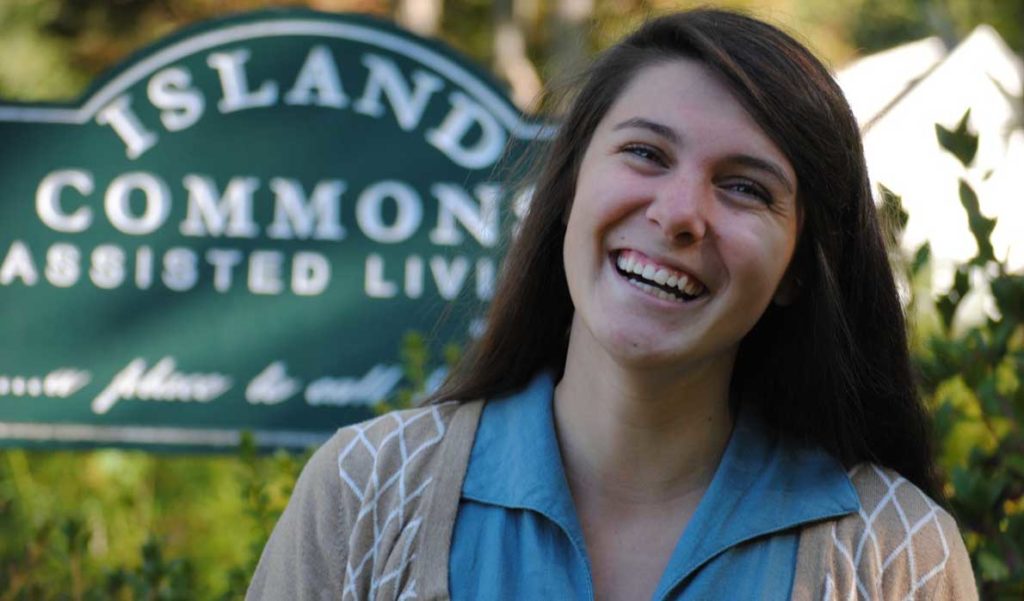Editor’s note: Reflections is a monthly column written by Island Fellows, recent college grads who do community service work on Maine islands through the Island Institute, publisher of The Working Waterfront, and AmeriCorps. Maddey Gates has been helping with elder care efforts on four islands.
To reach an island, you must cross something. As the Island Institute’s Elder Care Fellow, I have had the wild and wonderful opportunity to live and serve on four islands, for one quarter each, working with and learning about aging services.
Many of the most meaningful moments during my time in Maine reflect this strange new identity as the “traveling fellow.” My friendship with the Swan’s Island/Frenchboro mail boat captain and how I tackled two miles of the Atlantic Ocean and years worth of self-doubt is a favorite.
I come to Maine from Frankfort, Kentucky—the small capital city of a state carved through by rivers, fittingly built along one. We Frankforters cross this obstacle with manmade bridges almost daily—without thinking, effortlessly. Up to this year, crossings in my life have been seamless—from homeschooling to high school to college.
In Maine, I found new ways to cross.
Every three months this year, I have packed my car to the brim and traveled to another ferry terminal for another trip across a great deal of water. Crossing is a concept more than familiar for island people. For me, it is pretty new. For the past nine months, crossing has been essential, and symbolic of my experience.
Four or five days a week, the mail headed to Frenchboro finds itself aboard a shrimping-turned-lobster boat named Sparrow heading out from Swan’s Island’s Burnt Coat Harbor.
If you happen to live there and have a friend on Frenchboro, you can wait outside the fishermen’s co-op for a beige pick-up and the mail boat captain—also a lobsterman, bus driver and retired pastor—will row you out to his boat. During the 15-minute crossing, you might hear about his world-class coonhounds, ten beautiful children, or where to spot “the sleeping elephant” of Mount Desert Island.
If you’re lucky, on the way back, he might change your life.
After a handful of trips, my curiosity and his openness quickly turned our small talk into thrilling anecdotes. One day “thick of fog” he taught Navigation 101. On the return trip the following clear day, he stepped away from the wheel and told me with a grin: “You’ll always be a bait bagger if you don’t learn to steer.”
I did as he said, took hold of the wheel and the 15-minute joy ride took a turn into the danger zone. In my mind, every pot buoy became a depth charge and all our lives rested in my uncertain hands. As we rounded the inside shore of Harbor Island and he slowed the engine, I assumed he would take over any second.
Suddenly we were coming in fast—boats were left and right and he was explaining how to shift the engine to neutral and reverse, calmly demonstrating how to “swing” it up to the dock safely with a screwdriver and a block of wood, assuming we would survive. (You guessed it, we did.)
That day, the captain inspired strength and accomplishment through teaching what he knew well. As a pastor, father of ten, and provider of valuable services to two communities as mail courier and bus driver, the captain’s life has involved a great deal of transportation and guidance.
Through this and so many other interactions with older islanders, I have had the chance to slow down and be completely present, to open myself to their words and stories. If you invest, time can stretch, and a moment can be enough to reach someone, to make a connection, to learn something wonderful.
Time is not something we must measure in months, years or milestones. The depth and importance of our connections come from our ability to see their value. I measure my year in these organic connections with the remarkable people I have met. Each connection has grown from a conscious, and at times challenging, decision to slow down, pay attention, ask questions, and be genuine with every crossing.





